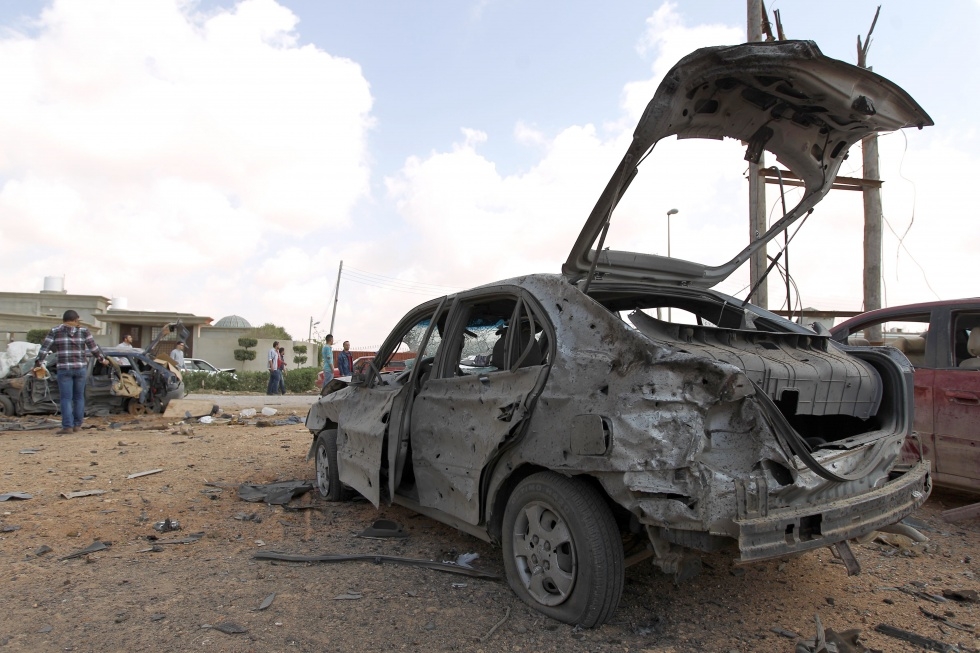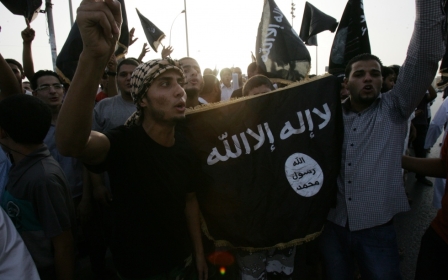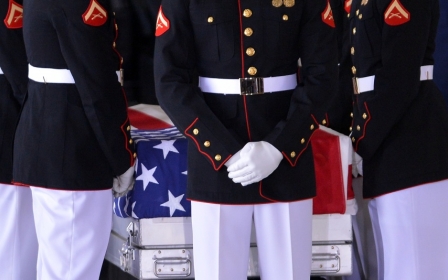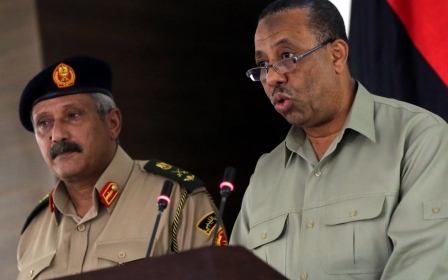Car bombing hits Benghazi amid civil war fears

A car bomb at a checkpoint in Benghazi on Wednesday evening left the attacker dead and injured five policemen, according to security officials, as a series of political crises continue to rack the country’s troubled transition process.
“A suicide attack took place Wednesday evening at the Berses post and, according to preliminary information, there are a number of victims of the explosion,” local security service spokesperson Ibrahim al-Sharaa told AFP.
Station commander Suleiman al-Agouri later confirmed the death of an unknown suicide attacker to AFP and said five of his officers had been injured, including one who lost a leg in the explosion. Agouri said the attack happened when the bomber “drove a refrigerated lorry which he exploded upon arrival at the post” in Benghazi.
Reports in local media said the Berses checkpoint was run by men loyal to rogue general Khalifa Haftar, who is leading a military campaign against “terrorism” in Eastern Libya. Haftar and his non-governmental “National Army” attacked the restive city of Benghazi on 16 May, killing at least 79 people, and has been labelled an outlaw by the government who accuse him of attempting a coup.
Haftar himself was allegedly the target of a suicide bombing last week, with an attack on his farm outside Benghazi killing three men and causing minor injuries to the former army general. Late on Wednesday evening Haftar’s spokesperson told the Turkish Anadolu Agency they had arrested someone in connection to the attack.
“We’ve arrested the main suspect in the suicide bombing that targeted the command base of general Haftar in the eastern city of Benghazi last week,” Mohamed Hegazi told Anadolu Agency by phone.
He said the suspect, who was arrested by forces loyal to Haftar on Tuesday, had confessed to masterminding the attack, adding two others were also being held. Hegazi, however, refused to divulge the identity of the detainees or the group behind the failed attempt on Haftar’s life.
Haftar has said he will halt violence on the date parliamentary elections are to be held - on 25 June. The powerful Ansar al-Sharia militia, a principal target of “Operation Dignity”, has rejected a ceasefire with Haftar, although their leader said on Wednesday they are prepared to lay down their weapons if Islamic law is applied by the country’s new constitution.
“The Ansar al-Sharia is ready to give up its arms if the new constitution guarantees the application of Islamic sharia,” militia leader Mohamed al-Zahawi told the privately owned Free Libya television channel.
Zahawi denied the group were involved in the almost daily assassinations taking place in Benghazi, saying “we are ready to take responsibility if investigations proved that any of our people were ever involved in Benghazi assassinations”.
Ansar al-Sharia came to prominence during the 2011 uprising that overthrew former leader Muammar Gaddafi. The group, which claimed responsibility for the killing of American ambassador Chris Stephens in Benghazi on 11 September 2012, has been designated a terrorist organisation by the US.
Although the group exist as political pariah, having rejected democracy as “un-Islamic”, the country’s Grand Mufti has recently called for them to participate in the democratic process. Sheikh Sadik al-Ghariani called on Ansar al-Sharia to engage in politics and be a “better example to people in attitude, revealing the true face of the Sunna and correct implementation of the words of Allah”, according to local daily Libya Herald.
Ghariani himself has been at the centre of a political storm this week, after telling Wataniya TV channel that Libyans have an “obligation” to fight against Haftar and anyone who dies doing so will be considered a martyr. He said those who support the retired general “will die an infidel”, a remark that has sparked calls for him to step down as the country’s most senior religious leader.
Mustafa Abdul-Jalil, popular leader of the National Transitional Council that led the 2011 revolution, said Ghariani’s comments were unacceptable and called for his removal from an office Jalil appointed him to in May 2011.
“The Mufti has lost the confidence of Libyans and according to the law that brought him into office, he is no longer eligible for service,” he told local television channel Al-Asima on Tuesday evening.
Support for Ghariani has dropped in recent months and his offices in the capital Tripoli were the subject of an RPG attack on 8 June. Reports at the time suggested Haftar’s forces had been responsible for the attack, an accusation that was later strenuously denied by spokesperson Hegazi.
Meanwhile the country’s political turmoil extended into the judiciary on Wednesday, when the newly appointed prosecutor-general refused to take up his role in protest at parliament sacking his predecessor.
“I’m afraid that tensions and divisions within the parliament would spill over to the judiciary,” Al-Sadek Al-Sour said in an interview with the privately owned Ahrar channel on Wednesday evening.
The embattled General National Congress (GNC) had voted on Tuesday to send Sour’s predecessor, Abdel-Qader Radwan, into forced retirement, with a parliamentary spokesperson denying the decision was politically motivated.
Omar Hemeidan said Radwan had been fired because of his “failure to keep up with rapid developments in Libya with serious investigations into national security cases”.
Sour said he had not been made aware of his appointment in advance and could not take on the burdensome role.
“Although I am legally eligible to take the post, I cannot bear such a tremendous responsibility,” he told the Ahrar channel.
Libya is the midst of numerous political divisions and battles, with many fearing a civil war is imminent. The Supreme Court ruled earlier this week that a GNC vote to appoint a new prime minister was invalid, leaving the country in a state of limbo ahead of elections later this month.
There is hope the upcoming elections will ease political tensions and provide a route to reconciliation among the various disparate and factious interests in Libya. There are fears, however, of low voter turnout with less than 30 percent of eligible voters registering to take part, according to the Higher National Electoral Commission.
New MEE newsletter: Jerusalem Dispatch
Sign up to get the latest insights and analysis on Israel-Palestine, alongside Turkey Unpacked and other MEE newsletters
Middle East Eye delivers independent and unrivalled coverage and analysis of the Middle East, North Africa and beyond. To learn more about republishing this content and the associated fees, please fill out this form. More about MEE can be found here.




